Three-Day International Conference
on
“Women’s Empowerment: Paradigms, Sources, Methodologies”
January 6-8, 2012
Calicut, Kerala
Organised by
Institute of Objective Studies
&
National Women’s Front, Kerala
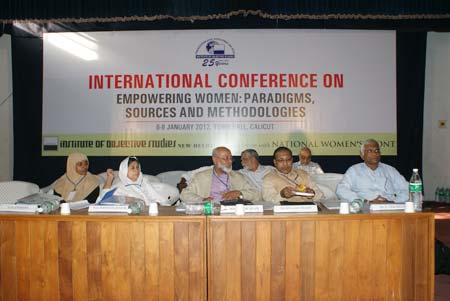
L-R: A.S. Zainaba, President, NWF; Prof Nasneem Begum, Political activist and educator; Dr Mohammad Manzoor Alam, Chairman IOS; Dr. Abusaleh Shariff, Cheif Economist, NCAER and Member Secretary, Sachar Committee; Dr.P. Ibrahim, Dept. of Economics, University of Pondichery
IOS 3-Day International Conference on Women’s Empowerment at Calicut
Calicut, January 6: A three-day international conference on “Women’s Empowerment: Paradigms, Sources, Methodologies” was inaugurated here today by economist Dr Abusaleh Shariff with an address on “Gender Empowerment in India: Concept, Measurement and Policy.” The conference was organised by the IOS in collaboration with National Women’s Front.
He said on the six measures––human capital, work participation, household decision making, economic resources/assets, reproduction and child care, political participation–– women’s empowerment in India had a long way to go.
He advised the audience (largely women) filling the Town Hall chalk-a-block to work for the empowerment of women, who happened to be “exactly 50 percent” of the human population.” He said God had ensured equality of gender by making men and women in equal numbers.
“Historically, women have been warriors, business persons, teachers. The Constitution of India has given women a status equal to that of men”, Dr Shariff asserted.
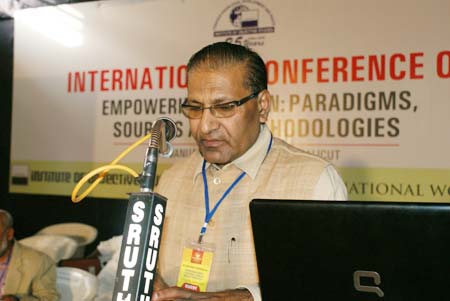
Speaker: Dr. Abusaleh Shariff, Cheif Economist, NCAER and Member Secretary, Sachar Committee
He said a lot of wealth was being created in India and a lot of development was underway. However, women were not getting their full share of it. Even in the highly-literate Kerala there was a gap of 10 percent between the literacy of men and women, which was, of course, higher in other states.
“Men come to seminars like this and go home, without much change. There is no follow up,” he regretted.
The concept of gender equality evolved at the UN. Gender difference in health and morbidity, opportunity, protection of law and wages were important indicators of empowerment, or the lack of it, he explained.
In her keynote address Prof. Nasneen Begum said that women’s empowerment did not mean that women had to “overwhelm men or compete with them,” but to work together with men “to reconstruct society.” She added that the key to gender empowerment was education and “Islam is not inimical to economic development.”
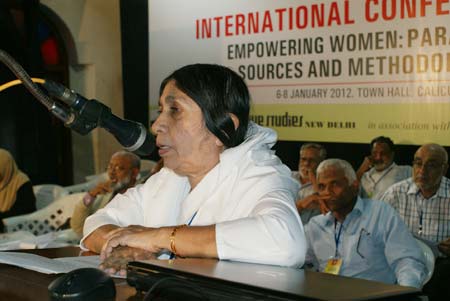
Speaker: Prof Nasneem Begum, Political activist and educator
The welcome address was delivered by Dr A A Vahab, Secretary IOS Calicut chapter.
In his presidential address, Dr Mohammad Manzoor Alam, Chairman IOS, explained the idea of IOS Silver Jubilee Celebrations, under which 14 conferences had been planned all over India between April 2011 and 2012 under the broad theme of “Knowledge, Development and Peace.” The Calicut conference was tenth in the series.
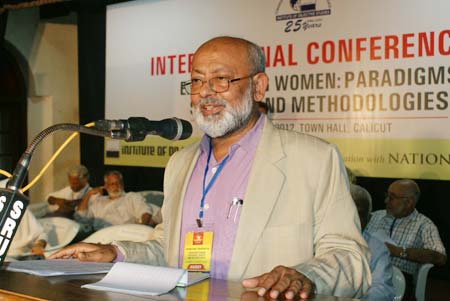
Speaker: Dr Mohammad Manzoor Alam, Chairman IOS
Regarding gender relations he said, “Islam envisages complimentarity of sexes and position coming with responsibility. Biological differences necessiate different responsibilities.”
He said, “Maqasid-e-Shariah guide the empowerment of Muslims, underlying which is education.”
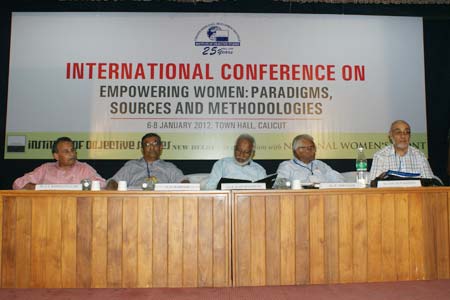
L-R: Dr. A.I. Rahmatullah, Dept. of Arabic, University of Calicut; 12. Mr. V. A. Kabeer, Writer and linguist; Dr. K.M.Muhammad, Dr. P. Ibrahim, Dept. of Economics, University of Pondichery; Dr. Yousuf Dadoo, Durban, South Africa
The conference featured eight business sessions, the first of which was scheduled for the inaugural day. The theme of the first business session was “Islam and Gender Justice.” This session was chaired by Dr P Ibrahim.
Dr Yousuf Dadoo from Durban, South Africa, spoke on “Muslim Women’s Law Against the Backdrop of Maqasid al-Sharia.”
He said 350 verses of the holy Quran deal with issues of law, 140 with salat, Hajj and fasting and 70 with issues like marriage, divorce and inheritance.
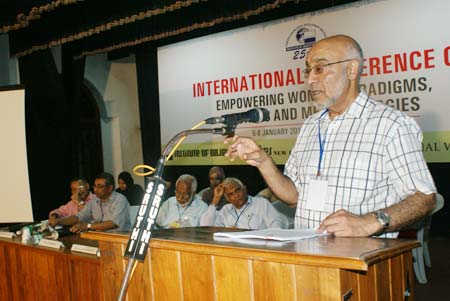
Speaker: Dr. Yousuf Dadoo, Durban, South Africa
Islamic law, he averred, is guided by Maqasid-e-Shariah, which facilitates the understanding of issues amid seemingly disparate directives. In this scheme of things adl (justice) is a core value. “If something goes against this, it is not Islam”, he asserted.
Fair, equal and just treatment of women is central to Maqasid-e-Shariah, he said. An elaborate discourse on the issue was not possible because of the limited time allotted to speakers, he said.
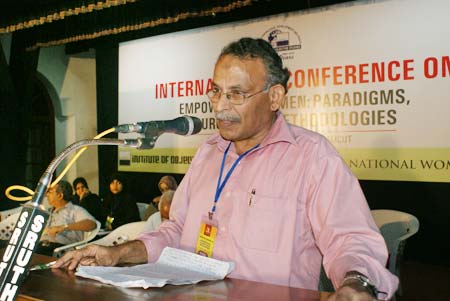
Speaker: Dr A.I. Rahmatullah of the Department of Arabic, University of Calicut
Dr A.I. Rahmatullah of the Department of Arabic, University of Calicut, in his paper on “Gender Equity in Islam” gave a rather different reading of the issue. Most parts of his paper were in Malyalam, but the English part contained observations like “Western feminists like Ameena Wadud, Fatima Mernissi and Catherine Bullock are Western propagandists.” Also, “Islam has been generous to women. Wives get free shelter, free food, clothing and free entertainment.”
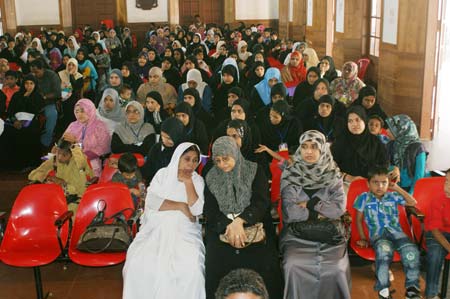
A view of audience
Quite a few of the discussions and presentations were in Malyalam.
Day-II
The theme of the second session, chaired by Dr. Fathima, was “Women in Religions and Ideologies.” The speakers scheduled for this session were Shameema Islahiya (MGM State Gen. Secretary), whose topic was “Empowerment of Women: Concepts and Strategies.”
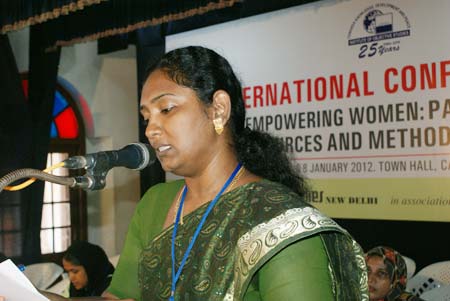
Speaker: Dr. Razia Parveen, Chennai
Razia Parveen’s paper talked about a digital divide corresponding to the gender divide that worked against the empowerment of women.
In a brief intervention, Dr Alam said the equation was undergoing change in the 21st century.
In his turn, Dr Abusaleh Shariff said that the gender division was not natural, but a social construct. Discrimination against women was common in underdeveloped and developing societies. It was, to some degrees, there in developed societies as well. Even in advanced societies, women were getting lower wages than men did for the same work. He asked for a quick end to it.
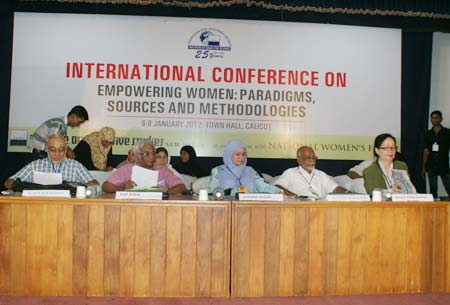
L-R: Dr. Yousuf Dadoo, Durban, South Africa; Shafi Ahmad Ko, Chennai; Shareefah Shaidah, Malaysia; Dr. Saeed Marakkar; Hendra Henny Andries, Indonesia
Shabna Siyad Kochi compared Islam to other religions favourably, concluding that Islam gave women more rights than others religions did.
Hendra Henny Andrese, minister councillor in Indonesian embassy in New Delhi, elaborated upon the national campaign for empowerment of women in her country. The campaign was being run from the national capital and state capital level to district and village level. The Indonesian Prime Minister Ms Meghawati Sukarnoputri was deeply committed to it.
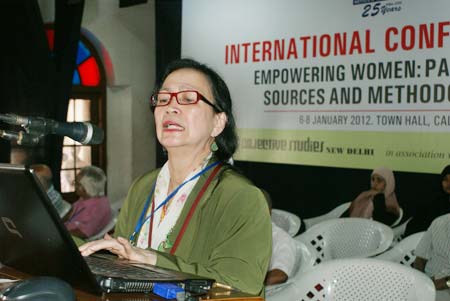
Speaker: Hendra Henny Andrese, minister councillor in Indonesian embassy in New Delhi
Several sessions of the day were merged together and quite a few speakers who where not on the original schedule presented their papers.
Among the new speakers were Andrese and Malaysia’s Shareefa Shaida, who is one of the close associates of former Malaysian Deputy Prime Minister Anwar Ibrahim.
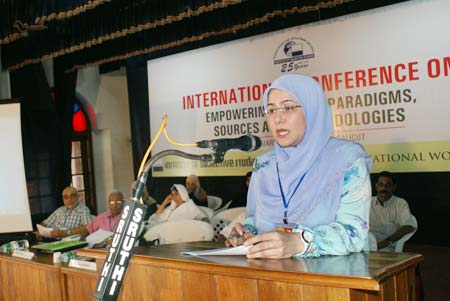
Speaker: Shareefah Shaidah, Malaysia
Shaida presented the teachings of Islam in the Asian and global perspective and said Islam did not come into conflict with the highest values of any civilisation.
Jameel Ahmad, in his paper “The Truth About Sex-based Role Divisions in Muslim Societies” said the “true Islam” based its premises on the Quran and the Sunnah. He compared doctrinal Islam’s precepts to the aberrant Western ways and the scantily-clad Western woman to the securely vieled Muslim woman. He concluded by saying that Islam is “a very grossly misunderstood religion”, which makes it difficult for others to understand how helpful it has been to women.
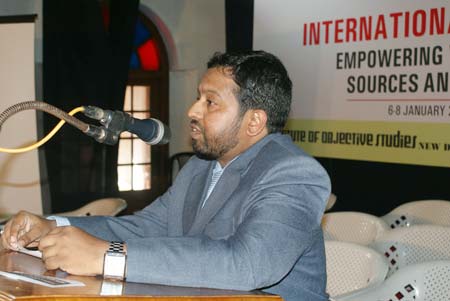
Speaker: Dr. Jameel Ahmad, Bangalore
In his address Dr Mohammad Manzoor Alam lauded the enthusiastic participation of Calicut’s men and women. He said an Islamic perspective and reference to Islamic sources for understanding current issues would be more reliable than Western sources and perspectives.
Day-III
The theme for the sixth business session, chaired by Abdur Rahman Baqavi was “Representation of Women.” The welcome address of the day was delivered by Abdul Malik K.V. The second topic of the session was “The Role of Women in Political Change in the Middle East.”
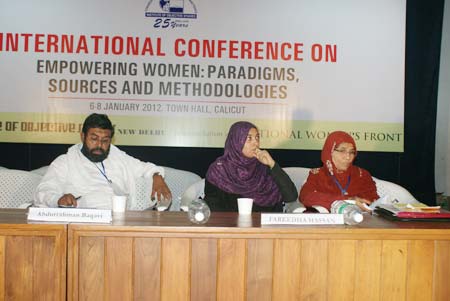
L-R: Abdurrahman Baqavi; Fareedha Hassan; Zulaikha Rasheed
Zulaikha Rasheed compared Western women to Muslim women with advantage to the latter. She said there were trends in Arab and Muslim world of increasing participation of Muslim women in public sphere. She talked about “veiled and unveiled women working together to usher in and sustain the Arab Spring.”
Prof. Habeeba Pasha featured as a discussant in this session.
The theme for the seventh business session was “Faith and Empowerment.” It was chaired by Ehjazul Haque (SIS, Manjeri) and the presentation was made by A.A. Vahab in Malyalam. Rafeeq Kuttikattoor and Sajidha Rafeeq were discussants.
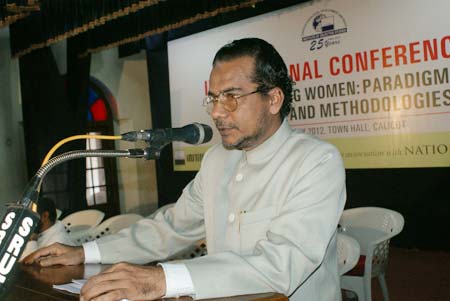
Speaker: A.A. Vahab, Secretary IOS Calicut Chapter
The eighth session had “Women as Commodity” as its theme and was chaired by Sheeba Sageer. In her paper on “Representation of Muslim Women in the Media” Seema Mohsin lamented that the media portrayed Muslim women as suppressed and subjected to violence. This generalisation was supposed to have been made out of stray events in tribal areas of Pakistan, which were blown out of all proportion.
Similarly, Saudi Arabia was portrayed as a country hostile to women. This portrait had no nuances, no shades. “At best, it is a severely restricted picture. In many cases, it is untrue.”
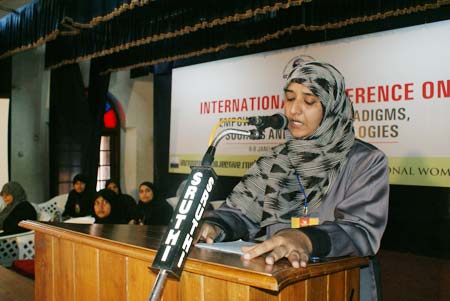
Speaker: Seema Mohsin, Bangalore
She said presenting stray events in tribal areas of Pakistan as representative of Muslim women’s situation worldwide was not fair. “Pakistani society is not run under Shariah, but by feudal lords and tribal traditions.”
Aberrations in Muslim society were overblown, but similar aberrations in non-Muslim societies were ignored by the same media, she concluded.
Sajida Begum’s presentation “Muashrey ki Burai aur Muslim Khwateen ki Zimmewari” (Evils of Society and Muslim Women’s Responsibility) was in Urdu. She enumerated social evils and particularly pointed out the evil of dowry among Muslims. She asked for a fatwa banning dowry.
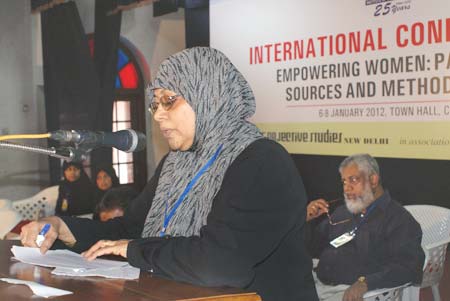
Speaker: Sajida Begum, Bangalore
In his intervention Dr Mohammad Manzoor Alam said that he had always supported the ban. In fact, the late Maulana Qazi Mujahidul Islam Qasmi had issued such a fatwa. However, he regretted that the mothers of bridegrooms often found out ways to circumvent the fatwa and get dowry on the sly by coercing the daughter-in-laws. “The Quran wants equality of gender, but such practices undermine it,” Dr Alam observed.
Dr Fakhruddin Ahmad as a discussant congratulated the organisers for holding such an important conference.
He also congratulated “sisters from Kerala” for having achieved 90 percent literacy, which was a model for the country. He mentioned the remarkable progress made by Andhra and Hyderabad Muslims, having established a large network of good-quality educational institutions.
For the valedictory session Prof. P. Koya welcomed the participants. The chief guest was Minister P.K. Abdur Rab and the guest of honour was Justice A.M. Ahmadi, former Chief Justice of India. Justice Ahmadi also delivered the valedictory lecture. Dr Alam chaired the valedictory session.
In his address Justice Ahmadi congratulated the IOS and wished it a long life and a “golden jubilee” in decades ahead.
Putting a legal and constitutional perspective on the issues involved, he said, “Muslims are entitled to equal rights under the Constitution and the law of the land.” The Preamble promised justice, equality and respect to all individuals and groups, which made it incumbent on everyone to be accommodative of others for the plural society to flourish, he said.
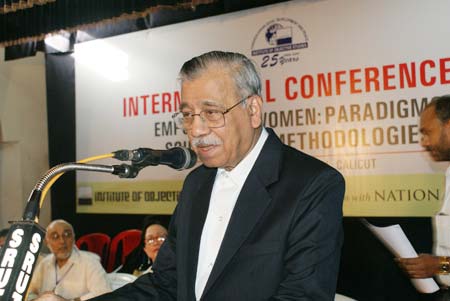
Speaker: Justice A.M. Ahmadi, former Chief Justice of India
“These basic values have, unfortunately, got diluted over the years. Secularism demands a wider vision, not limiting ourselves to our immediate group, but to be part of the wider society as well.”
With secularism, socialist ideals of the Constitution, too, had been eclipsed. The Constitution had envisaged an economic order different from what obtained today. “Today’s dwarfs have diluted the Constitution created by giants of yesterday.”
Justice Ahmadi also talked about “roadblocks in the way of social justice being put up by a certain party that raises the bogey of appeasement.”
He said the makers of India’s Constitution wanted “a socialistic pattern of economy, but we are moving towards a full-blown capitalist economy.” The “party” that Justice Ahmadi referred to opposed secularism on flimsy grounds, one of them being “secularism’s Western origin.”
He expressed happiness over the fact that among his audience women heavily outnumbered men. Justice Ahmadi took it as an indicator of women’s interest in empowerment issues.
“Women suffer within family and outside it,” he observed. For the sufferings inside families, the cure too was within families. For this as well as other kinds of sufferings the panacea was education.
He pointed out two major sources of distress of Muslim women: easy divorce and polygamy. The two threats hung on the heads of many Muslim women as a Damoceles sword, destroying their happiness and forcing them to live in a climate of uncertainty.
He advised the audience not to run away from problems, but to face and address them. For that, access to education was vital as it made a life of dignity possible. Human rights represented a set of powerful weapons that had to be employed by the weak in the struggle for justice and equality.
Justice Ahmadi concluded by saying that women were not helpless as they had the power of law and justice on their side.
In his presidential address, Dr Mohammad Manzoor Alam introduced the IOS and its Silver Jubilee programme. He also announced the establishment of an IOS centre for Women’s Studies in Calicut in days ahead.
He observed that the Muslim community had not been properly familiarised with the provisions in the Constitution for education, nor with the vital content of Sachar Report, Rangnata Mishra Commission’s recommendations, or those of National Knowledge Commission. He advised the audience to familiarise themselves with these documents.
“Muslims, who are equal stakeholders in the country, have been left behind all others.” This was largely because of educational backwardness. He quoted Islamic scholar Yusuf Qardawi’s observation regarding the general educational backwardness of Muslims: “We all are juhla (ignoramuses).”
Dr Alam expressed satisfaction over the fact that Kerala’s Muslims had achieved a high rate of literacy. However, he warned against confusing literacy (the three R’s) with education. Muslims, including Kerala Muslims, were still far behind others in meaningful education.
“Study medical and engineering, by all means. But don’t ignore liberal education, law, other subjects,” he advised.
He showed concern over a reported rise in divorce rates. “Conduct surveys and find out the facts, not to refute allegations, but to reform society”, he counselled.
Prof. Yousuf Dadoo in his brief remarks on the conference asked everyone not to dismiss Muslim feminists’ views summarily, but to consider them thoughtfully as they had vital points that would benefit Muslim societies.
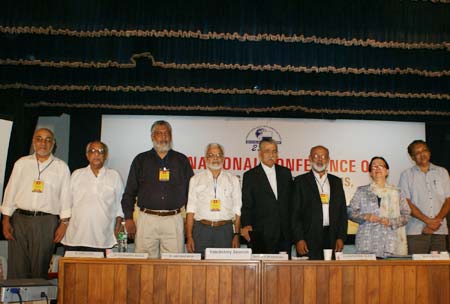
Group photographs of the speakers of Valedictory Session
From Left to Right: Dr. Yousuf Dadoo, Durban, South Africa; O. Abdulla, Veteran writer and columnist; Dr.Fakhruddin Mohammad, Hyderabad; E. Abubacker, National President SDPI, Calicut; Justice A.M. Ahmadi; Dr. M. Manzoor Alam; Hendra Henny Andrese; Prof. P.Koya, IOS Calicut Chapter Coordinator
The following were honoured by the IOS over the three days:
List of Awardees
1. Mr. Ali Ashraf
Young Journalist who has changed a traditional religious weekly into a forum for constructive discussion and debate open to all.
2. Mr. P. N. Das
As writer and editor, he has fore fronted environmental issues, problems of medical ethics and alternative therapies, in a language known for felicity and grace.
3. Dr Mustafa Kamal Pasha
Activist, scholar and writer he has written series of books, translated major collections of Hadith, produced videos to put across the contemporary dimensions of the religion of Islam.
4. Mr. Jamal Kochangadi
The writer-editor who has transformed the stale weekend journalism in to a vibrant genre articulating the passion and despair of the common people.
5. Mr. K. K. Baburaj
Activist and writer known for his pursuit of an alternate narration of the social changes in Kerala disengaged from the official, upper caste and hegemonic rendition of history
6. Shaykh Mohammed Karakunnu
Prolific writer and public speaker he has been instrumental in bringing about the first comprehensive encyclopedia of Islam in Malayalam.
7. Ms. Jameela A.
Scholar, public speaker and activist. She has helped hundreds of women to break shackles of obscurantism and ignorance.
8. Ms. A. S. Zainaba
Activist and public speaker she has helped build up a radically different women’s movement and in the process instilled courage and vision among the women folk
9. Mr. N. P. Chekkutty
Veteran journalist and commentator he has always stood up for media ethics and consistently tried to find space for the poor and the unrepresented.
10. Mr. O. Abdulla
Veteran writer, columnist and public speaker he has written and spoken with courage and conviction against rot and decay of social values and misrepresentation of the minorities.
11. Mr. T. K. Ubaid
Scholar and writer he has single-handedly changed Quranic literature in Malayalam by writing fresh, reader friendly interpretation of the Holy Scripture.
12. Mr. V. A. Kabeer
Writer and linguist. He has written some of the most beautiful books in Malayalam; translated stories from his mother tongue to Arabic and vice versa and carved out a literary niche of great felicity and style .
13. Prof. Nasneen Begum
Political activist and educator, she has introduced a doze of honesty and integrity to electoral politics and proved herself to be the champion of the poor and downtrodden in the city of Bangalore
14. Mr. E. M. Najeeb
Businessman and Philanthropist
15. Mr. Ahmed MP
Businessman and Philanthropist
16. Mr. P. V. Abdul Wahab
Businessman and Philanthropist
Resolution:
The conference has forefronted the following points:
There is notable increase in the violence against women especially those belonging to urban and rural poor and marginalized sections of the population. Domestic violence has also become a matter of great concern and in this respect no class or community is an exception. This is a sign of decline in universal religious values and the incursions made by materialist ideologies which consider human beings as merely economic animals
The role of men and women are complimentary to each other especially in building up a society based on equity and justice .There is strong evidence in history that this complimentarity and, not competition, has brought about creativity and cohesion in the humankind.
Better awareness and understanding about Islamic teachings on the position and role of man and woman will help remove misconceptions about gender justice and empowerment. Men and women are not rivals but partners in the process of social progress and harmonious co-existence.
The status of Muslim women is affected by the misinterpretation of Islamic laws on women’s rights. There is also the problem of influence of Indian patriarchal system on the role of women in society. So, for the real development of women of all communities, there should be a bipartisan committee to study the problems of women’s indignities in the model of National Commission for Women.
The delegates are of considered opinion that discussions and debate on the theme should be taken forward incorporating different dimensions of gender empowerment in the light of the Qur’an, Prophetic Traditions and modern knowledge. The present decade is witnessing fundamental and paradigm-changing events reiterating the need and capacity of religious teachings to overhaul the contemporary political and social thought as regards the role of women in the establishment of justice and equity for all people irrespective colour, creed or gender. But further researches, surveys and academic inputs are necessary to strengthen positive trends and to expose the pseudo-libertarian tendencies coming in the garb of modernity. Therefore the delegates call upon the Governing Board of the Institute to establish a centre for women’s studies at Calicut to facilitate research and academic pursuit in various disciplines related to the empowerment of women.
|